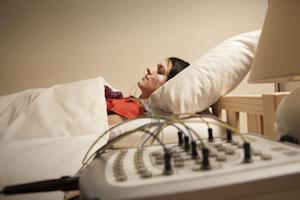Who, what & why
Researchers at the University of Salzburg, Austria and the University of California wanted to test the idea that if daytime heart rate variability (HRV) is strongly linked to physical and mental health, would HRV also be a predictor of healthy sleep?
Surprisingly, this has not been tested rigorously before, although HRV during sleep has been assessed in several previous studies.
This is a well-designed and thorough study that controlled the participants’ mental state before bedtime in a sleep lab and compared subjective sleep quality questionnaire results with gold standard polysomnography tests.
What did they do?
 29 female subjects took part in the study which spanned over 11 days – one at the start for familiarization/screening and three actual study nights, each separated by a night at home. A full-length emotionally neutral film about nuns going about their daily tasks was used to normalize the subjects’ mental state before sleep, and thereby minimize the impact of daily stressors. High frequency (i.e. parasympathetic) HRV was measured continuously during the film and used to establish the subjects’ baseline HRV that might predict sleep quality.
29 female subjects took part in the study which spanned over 11 days – one at the start for familiarization/screening and three actual study nights, each separated by a night at home. A full-length emotionally neutral film about nuns going about their daily tasks was used to normalize the subjects’ mental state before sleep, and thereby minimize the impact of daily stressors. High frequency (i.e. parasympathetic) HRV was measured continuously during the film and used to establish the subjects’ baseline HRV that might predict sleep quality.
During the following nights, the subjects were comprehensively hooked up to ECG, EEG and sleep measuring equipment, from which normal sleep quality measures such as sleep time, delay in falling asleep, sleep efficiency, number of arousals etc. could be calculated. The participants also had to fill in a subjective sleep quality questionnaire. The researchers then looked at correlations between all the sleep indices and the HRV measured during the pre-bedtime movie.
What did they find?
They found significant correlations to daytime HRV for the following variables:
- Sleep latency (i.e. time taken to fall asleep)
- Number of arousals
- HRV during sleep
- Sleep questionnaire total score
A higher daytime HRV predicted a shorter time to fall asleep and fewer arousals during the night, as well as a better sleep questionnaire score.
In contrast, they found no significant relation to total sleep time or sleep efficiency (time asleep/total time in bed).
Interestingly, HRV during sleep which had been studied previously was only related to the sleep questionnaire score, and less strongly than with daytime HRV.
What does it mean?
Higher daytime HRV was associated with better subjective and objective sleep quality, and the authors go on to suggest that daytime parasympathetic HRV (i.e. HF or RMSSD) is associated with the flexible regulation of arousal. This makes HRV a key marker once again, of internal processes, this time in the transition from wakefulness to sleep. This makes sense if we think about HRV as an indicator of parasympathetic rest and digest activity, and the counterpoint of the sympathetic ‘fight or flight’ state. In a natural environment, animals would only fall asleep quickly and sleep soundly when they feel safe and are not stressed.
Practical implications
All of us who have used HRV for even a short while will have figured out that a good night’s sleep is one of the best ways to revive a low HRV score, but we also know that temporarily reducing our HRV through training workouts is a good way to stimulate the adaptations necessary to improve our athletic performance.
These findings place more emphasis on recovery techniques that will get HRV as high as possible before bedtime to allow that all-important sleep to be fully effective.
Here are some ideas to do this follow, but please also contribute your thoughts too:
- Try to do intensive e.g. HIIT sessions as early in the day as possible so your HRV gets a chance to recover before bed
- Good quality nutrition and hydration (dehydration stresses your system!)
- Cold showers/ice baths before bedtime are proven to increase HRV
- Deep breathing exercises increase HRV
- Avoid bright lights and LED screens before bedtime
High cardiac vagal control is related to better subjective and objective sleep quality. Gabriela G. Werner et al 2015

Hi Simon, could you please provide a link to the original research? It’s article or authors? Cheers, Stacey
Hi Stacey,
Sorry that link should have been in the original post. Updated now.
Are you planning related work?
I know cold showers etc raise HRV but this is opposite to what I would think one would want before going to sleep. A nice warm bath cools the core and for me gives me a good nights sleep. I struggle to sleep when too warm and an ice bath would warm me up too much.
That is a valid point, it’s always important to consider what works for the individual!